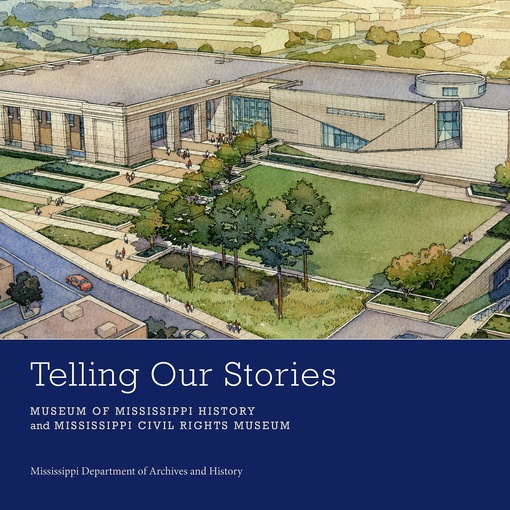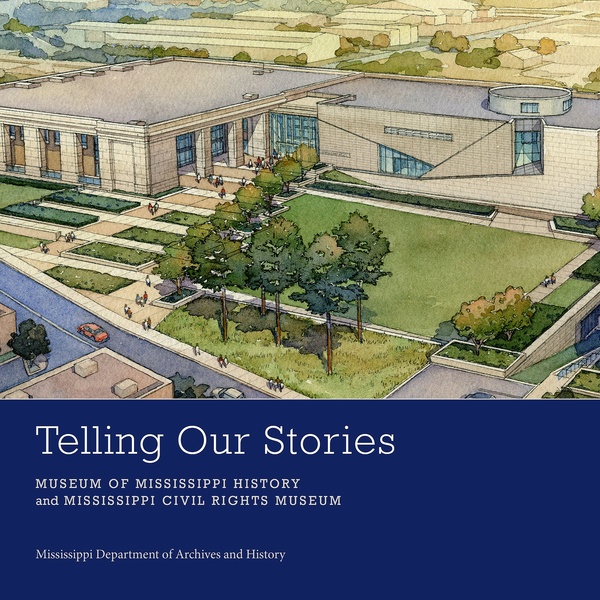
Telling Our Stories
Museum of Mississippi History and Mississippi Civil Rights Museum
Contributions by Reuben V. Anderson, Haley Barbour, Kane Ditto, Myrlie Evers, John E. Fleming, Dennis J. Mitchell, and William F. Winter
On December 9, 2017, in celebration of our state’s bicentennial, the Mississippi Department of Archives and History opened two state-of-the-art museums—the Museum of Mississippi History and the Mississippi Civil Rights Museum. The Museum of Mississippi History explores the entire sweep of the state’s history. The Mississippi Civil Rights Museum, the first state-operated civil rights museum in the country, explores the period from 1945 to 1976, when Mississippi was ground zero for the Civil Rights Movement nationally.
This companion book highlights some of the Mississippi stories captured in the two museums. The book also tells the story behind the museum project, honoring those who made these museums possible and celebrating their commitment to making the museums the signature project of Mississippi’s bicentennial celebration.
Mississippi’s story comes to life through artifacts like a circa-1840 cotton gin, a contemporary Choctaw beaded medallion necklace, a banner from the state’s first black Masonic lodge, a boll weevil trap used in Grenada County, a chess set molded from bread by a Freedom Rider at Parchman Penitentiary, and a clock that stopped at the moment Hurricane Katrina flooded a Biloxi home. Never before have these objects been gathered together in one place or publication.
Telling Our Stories is an impressive and attractive volume providing a strong companion to the physical museums.
This book represents an effort by Mississippi to own freedom and slavery as two sides of one radical coin—'radical' in Ella Baker’s sense of getting down to and understanding root causes. After slavery was interrupted by Civil War, regression and Jim Crow rather than freedom and democracy became the new steady state. The Mississippi Theater of the Civil Rights Movement interrupted that state of white supremacy. Facing history, as this book does, is necessary to avoid another regression. As Ella reminded us, ‘in order to see where we are going . . . we must understand where we have been.'
As we celebrate our state’s bicentennial, we are also opening the two Mississippi Museums, portraying the confluence of history and conscience which are vividly shared through the very human stories compiled in this companion book, Telling Our Stories. With courageous thought, these stories speak their own truth, moving us forward with hope and determination in building a better Mississippi for all citizens.
I am pleased to celebrate Mississippi’s bicentennial with the opening of the Mississippi Museums. Telling Our Stories captures some of the inspiring and diverse history of our great state. Like all states, Mississippi has had trials and tribulations that cannot be forgotten or excused. But, we also have a rich history that should be celebrated by us collectively. I hope you will visit the museums often, as well as the other unique cultural attractions that Mississippi has to offer.
The two museums finally complete the picture of Mississippi as it is up until the present, leaving us with a challenge of how we choose to continue that picture into the future: the picture of a great people of many races and cultures that have, willingly or not, or even knowingly or not, all added their brushstrokes to the completed painting of our culture up until now.Here is our chance to fill in our individual gaps in our knowledge of the picture of Mississippi and to discover and acknowledge the contribution of all of us into the creation of what we are.
The two museums tell us that, no matter who we are, we didn’t get to this place by ourselves. And, they should strongly imply to us that we aren’t going forward alone, either.
Founded in 1902, the Mississippi Department of Archives and History collects and preserves the state’s historic resources, sharing them with the public through programs, events, educational outreach, a library, and museums such as the Museum of Mississippi History and the Mississippi Civil Rights Museum.





